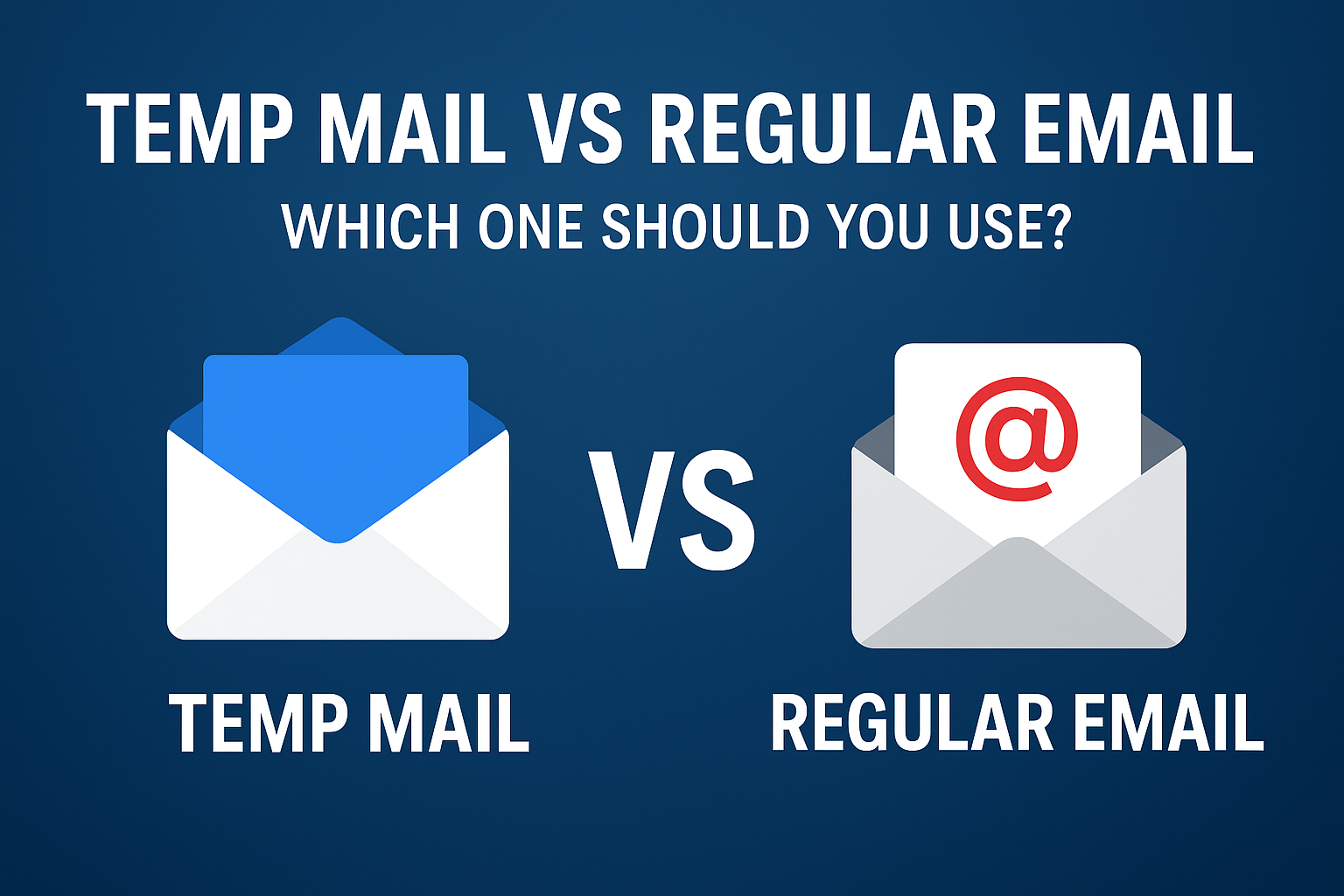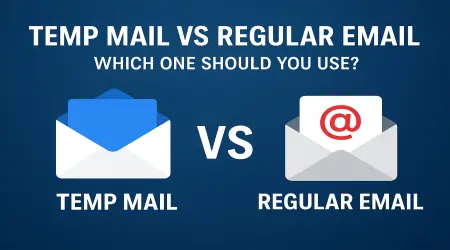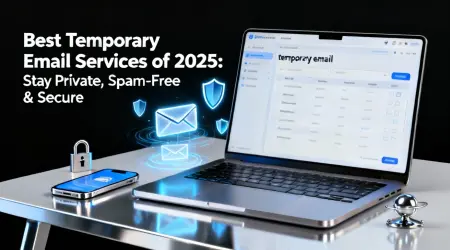

Temp Mail vs Regular Email: Which One Should You Use
Now In today’s world sending and receiving messages is very easier and faster than before mostly because of email. Normal email is used for both personal and work purposes helping people stay in touch no matter where they are live. But as online spam and privacy risks keep growing, many people now they look for safer options. One such better option is temporary email, also called “TempMail.” In this article, we will explain the main differences between temporary email and regular email, and when each one is useful.
What is Temp Mail
Temp Mail also called disposable email, is a free online service that gives you a short time period email address. Unlike a other regular email account (like Gmail, Yahoo, or Outlook), you don’t need to sign up set a password or share personal details.
This temporary email works for a limited time usually a few minutes to a few hours. During that time, you can receive emails such as verification codes links, or confirmations. Once the time end the address and all messages are automatically deleted.
TempMail is mostly used for:
Signing up on websites or apps or free trail without using your personal email
Avoiding spam or junk mail
Keeping your main inbox safe and private
What is Regular Email?
Regular email is the standard email account which one you created with other providers like Gmail, Outlook, or Yahoo. It’s your permanent email address that belongs only to you. To set up your email for this usually you need to provide personal details such as your name, password, and sometimes a phone number for security reason.
With a regular email, you can:
you can Send and receive messages anytime with documents
Sign up for important accounts like banking, Ecommerce
Sign up for important accounts like shopping, or social media
Store messages, files, and attachments for future use
Keep a long-term communication channel for personal or work needs
Unlike disposable Mail, a regular email does not expire. As long as you keep it active, it stays with you for years.
Regular Email: A Trusted Means of Communication
Your Regular email will remains one of the most reliable tools for online communication. Platforms like Gmail, Outlook, and Yahoo provide secure, long term access that supports both personal and Business needs.
More than simple messaging, regular email offers the ability you can manage your important accounts, store files, and maintain long-term communication channels. Its global recognition and consistent security make it a trusted method of communication in today’s digital world.
Why Regular Email is Useful
Long Term Access – your regular email account doesn’t expire, so you can use it for years without any worry or problem.
Security Features – Mostly Email providers offer passwords, two-step verification, and recovery options to keep your account safe.
Universal Acceptance – All major platforms, banks, and businesses accept regular email for sign-ups and communication.
Full Functionality – Unlike temp mail, you can both send and receive messages anytime.
Professional Use – Ideal for work, business, and official communication where trust and consistency matter.
Data Storage – Many Email providers give free storage for files, attachments, and important messages.
Disposable mail hub: The Disposable Email Solution
The best part about temp mail is that it will automatically disappears.
Disposable mail hub: A Simple Disposable Email Option
Disposable mail hub: The Quick and Secure Way to Stay Private
Disposable mail hub: Your Go-To Disposable Inbox
Disposable mail hub: A Fast Solution for Temporary Emails
Disposable mail hub: Protect Your Privacy with Ease
Use Cases for Regular Email and Disposable Mail Hub
Regular Email
Regular email (like Gmail, Yahoo, or Outlook) for long-term use. It is best when you need a stable and secure account for:
Work and Business – sending and receiving professional messages or business meetings.
Personal Communication – staying in touch with friends and family.
Online Accounts – using the same email for banking, shopping, or social media.
Data Storage – saving important files, conversations, and contacts.
Disposable Mail Hub (Temporary Email)
Disposable Mail Hub is short time and is best for quick, one-time tasks. People usually use it when they don’t want to share their real email. Common uses include:
Website Sign-Ups – sometime you creating accounts on sites you don’t fully trust.
App Testing – checking new apps or services without using your main inbox.
Avoiding Spam – keeping your personal email safe from junk mail.
Privacy Protection – hiding your real email from unknown websites.
| Feature / Use Case | Regular Email (Gmail, Yahoo, Outlook, etc.) | disposablemailhub (Temporary Email) |
|---|---|---|
| Account Duration | Permanent stays active until you delete it | Temporary expires after minutes or hours |
| Sign-Up Required | Yes needs registration, password, and personal details | No instant access, no sign-up needed |
| Best For | Business, personal use, banking, social media | One-time sign-ups, testing, avoiding spam |
| Security & Privacy | High security (2FA, recovery options, encryption) | Basic privacy, but no recovery once deleted |
| Storage | Large space for emails and attachments | No storage, emails disappear after expiry |
| Access Devices | Works on phones, laptops, and email apps | Works only through the website while active |
| Spam Risk | Can receive spam if email is shared widely | Low risk since email is short-lived |
| Personal Identity | Linked to your real details (name, phone, etc.) | Anonymous – no personal details needed |
Limitations of Temporary Email
disposable emails aren’t suitable for everything
You can’t use them for banking, PayPal, or e-commerce.
Once deleted, you can’t recover the inbox.
Some sites block temporary email domains.
FAQ
Is it legal to use temporary email?
Yes using temp mail is legal in most countries. It’s simple a tool that provides you a temporary email address for privacy and convenience. Many people use it for things like:
Signing up for free trials without spam
Testing apps or platforms
Is it possible to send messages using a temporary email?
In most cases, no. Temporary email services are designed as receive-only inboxes, meaning you can get verification codes, newsletters, or one-time links, but you can’t send or reply to messages.
How long do emails stay in a temp inbox?
Some platforms like DisposableMailHub let you keep your temp inbox longer, or even until you manually delete it.




